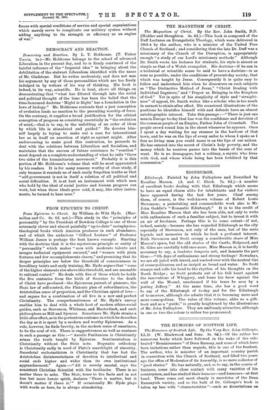Democracy and Reaction. By L. T. Hobhouse. (T. Fisher Unwin.
5s.)—Mr. Hobhouse belongs to the school of advanced Liberalism in the present day, and he is firmly convinced of the baleful influence of the " Imperial idea " in bringing about the debilitation of the stalwart Liberalism identified with the name of Mr. Gladstone. But he writes moderately, and does not mar his argument by any of those personalities which are too freely indulged in by writers of his way of thinking. His book is indeed, in its way, scientific. Ho is bent, above all things, on demonstrating that "what has filtered through into the social and political thought of the time has been the belief that the time-honoured doctrine Might is Right' has a foundation in the laws of biology." Mr. Hobhouse contends that a just conception of evolution lends no sanction to the prevailing worship of force. On the contrary, it supplies a broad justification for the ethical conception of progress as consisting essentially in "the evolution of mind,—that is to say, in the unfolding of an order of ideas by which life is stimulated and guided." He devotes him- self largely to trying to make out a case for international law as in itself an assertion of right as against might. After endeavouring to make good this contention, he proceeds to deal with the relations between Liberalism and Socialism, and maintains that the success of future resistance to "reaction" must depend on a complete understanding of what he calls "these two sides of the humanitarian movement." Probably it is this portion of Mr. Hobhouse's volume that will be most appreciated by his readers. It is for many reasons worthy of close study, if only because it reminds us of such easily forgotten truths as that "self-government is not in itself a solution of all political and social difficulties. It is at best an instrument with which men who hold by the ideal of social justice and human progress can work, but when these ideals grow cold, it may, like other instru- ments, be turned to base uses."






















































 Previous page
Previous page